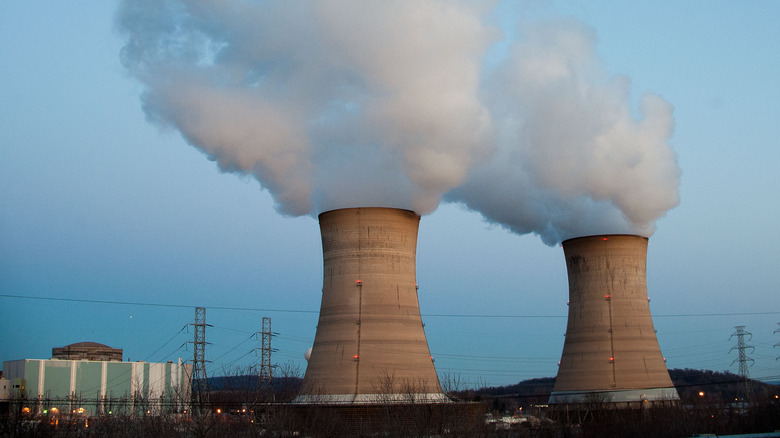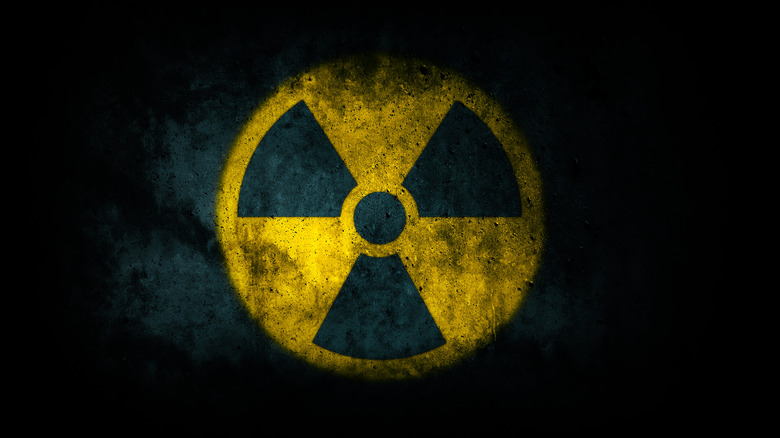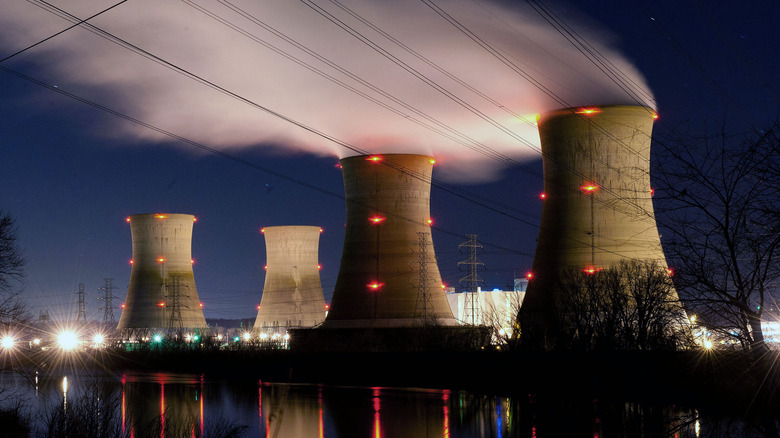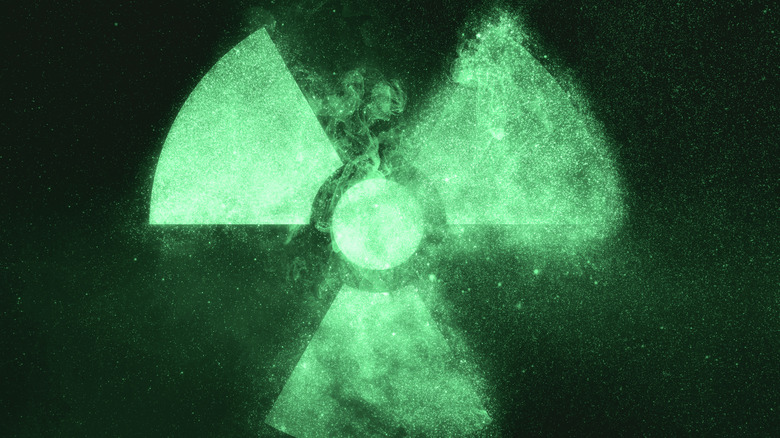How The Three Mile Island Meltdown Turned This Film Into A Blockbuster Hit
Nuclear power might sound like the way of the future. It's often pitched as an alternative energy source and a way to combat pollution. But it comes with its own risks. Whether it's the tragic history of Chernobyl or the plot of an action movie, the dangers of nuclear reactors are pretty well-known by now. What most Americans may not know, though, is that the country almost had its own tragedy at a nuclear power plant in Pennsylvania more than 40 years ago.
And, even more surprising, conversations around the events at that power plant on Three Mile Island were fueled by Hollywood. Per IMDb, "The China Syndrome," a movie released just weeks before anything went wrong, highlighted the risks of nuclear energy in a way that comes uncannily close to what actually happened in Pennsylvania -– and the entire ordeal made the movie a huge success, even as Three Mile Island came under harsh scrutiny.
How Hollywood approached the risks of nuclear energy
"The China Syndrome" wasn't the first film to look at the consequences of nuclear energy. Nuclear power had been around since the 1950s, and it wasn't widespread for another decade or two (via United States Department of Energy). But as nuclear power plants began to appear, some of the filmmakers in Hollywood started to consider how they might be used for drama and intrigue in films of the time. Michael Douglas, who starred in "The China Syndrome" in 1979, said in interviews that they knew they had to get the movie out soon to be ahead of any real tragedy (via Penn Live Patriot-News).
"[The screenwriter] told me it would be a race between getting the movie made and a major disaster," Douglas said. "The Three Mile Island situation really brings the point home. It's an eerie feeling."
Now, of course, there are dozens of films that look at the consequences of nuclear energy. But none of them have gotten the same reputation as "The China Syndrome" for predicting the real thing.
A question of safety and caution
Unlike plenty of action and sci-fi movies throughout history, "The China Syndrome" doesn't focus on some supervillain or monster pulling the strings. Instead, the central issues raised in the story are pretty mundane — they're just brought up on a wider scale. In the film, Jane Fonda plays a television reporter who's working on a story about a nuclear power plant (via The New York Times). During a visit to the plant, she and her cameraman witness something that seems like it might be a safety concern, but it's dismissed as a minor issue.
The film goes on to show the ways in which people might ignore some safety protocols and warning signs until eventually the worst-case scenario looms on the horizon: a nuclear meltdown that could "melt a hole to China," which is how the movie got its name (via Groovy History). While the U.S. government assured the public that it was all fiction and nuclear energy wasn't a public risk, those concerns were realized just weeks later.
The breakdown at Three Mile Island
At the time "The China Syndrome" was released, no one could have known how relevant it would end up being. Just weeks later, the reactor at Three Mile Island experienced technical and safety issues that almost caused a meltdown. The errors began with the plant's pump system, then with a relief valve that didn't work correctly (via Stanford). The people working at the plant didn't notice the issue at first, so the reactor experienced a partial meltdown and a hydrogen bubble built up, bringing with it the risk of an explosion.
In the initial moments following malfunction at the plant, officials assured citizens that the area was safe and there was minimal risk, according to The Washington Post — much like the scientists in "The China Syndrome." But officials at the time were concerned about nuclear fallout in surrounding communities, and the possible explosion. Pregnant women and children were eventually asked to evacuate, and even now, some wonder whether the radiation caused cancer in nearby residents at the time. The lack of clear communication with the public is one of the main criticisms of the Three Mile Island event (via Power).
A movie that surpasses fiction
"The China Syndrome" has some lines that seem downright chilling in retrospect. Beyond the obvious allusions to nuclear disaster and the lapse of safety protocols, there's one line in particular that seemed to resonate with viewers following the events at Three Mile Island: "The number of people killed would depend on which way the wind is blowing, render an area the size of Pennsylvania permanently uninhabitable — not to mention the cancer that would show up later" (quoted by Rolling Stone).
With a reactor in Pennsylvania entering a meltdown just a few weeks later and studies into possible cancer as a result of the fallout, is there any wonder the movie garnered so much attention? The studio behind the film, Columbia Pictures, had to stop showings in some areas as people began criticizing them for capitalizing on a tragedy (via Penn Live Patriot-News). That's despite the fact the movie was already showing before there were any signs of trouble at Three Mile Island.
Changing the narrative
The point of "The China Syndrome" was not inherently antinuclear for everyone, according to Rolling Stone, although it ended up coming across that way. The proximity to the events at Three Mile Island meant more attention was put on the risk of operating nuclear power plants, and according to NPR, the events in Pennsylvania put a halt to ordering more nuclear plant construction for decades. But for some of the people working on the film, it was supposed to come across as more of a human story that looked at how we can make mistakes.
"Individuals caught in a corporate or social structure that forces them to make a moral decision at the sacrifice of losing their lives. It's an effort at what is basically Greek tragedy — classic drama situations," actor and co-producer Michael Douglas told Rolling Stone.
If the film had been released at another time, maybe that would have been the focus. But as the conversation around nuclear power changed, "The China Syndrome" found itself benefiting from growing concerns about the risks — and the box office numbers indicate it was overall a good deal. The movie's domestic ticket sales came to nearly $36 million (via The Numbers).





